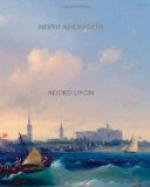The King of Poland and his counselor lodged that night in the city. Early next morning, Paulus came again for them.
“What do you wish to see, today?” he asked.
“Take us to some or your workshops and mills,” replied the King; “we would like to learn more of your social and industrial conditions, about which we have heard.”
A car soon took them to a part of the city where the workshops were situated. The buildings were not great, black-looking structures with rows of small windows in the walls; but they were handsome, spacious buildings, resembling somewhat the finest of the public buildings with which the visitors were acquainted in their own country. Remand noted the absence of smoking chimneys, and inquired about them.
“We have done away with all that,” explained Paulus. “Pure air is one of the essentials to life. One of the crudest imperfections of the past was the wilderness of smoking chimneys which belched forth their blackness and poison into the atmosphere. As you have noticed, our city is clean, and the air above us is as clear as that above forests or fields.”
“I suppose you use electricity for light and power,” remarked Remand; “but you need heat, too.”
“We use electricity for heat also,” was explained. “We get it direct from the earth, also have it generated by water power, both from falls and the waves of the sea, and transmitted to us. Some of these power stations are hundreds of miles away among the mountains, and by the sea. We have also learned to collect and conserve heat from the sun; so, you see, we are well supplied for all purposes. This building,” said the instructor, pointing to the one in front of which they had stopped, “is a furniture factory. Would you like to see it in working operation?”
“Yes; very much,” said the King.
They entered clean, well-lighted, airy rooms where beautiful machinery was being operated by well-dressed and happy-looking workmen. The visitors passed from section to section, noting, admiring, and asking questions.
“Whose factory is this?” asked Remand of the guide.
“You mean who has charge—who is the steward?” corrected Paulus.
“No; not exactly that. This magnificent plant must have an owner, either an individual or a corporation. I asked for the ownership of the property.”
The guide looked strangely at his companions. Then he realized that these men had come from the parts of the earth where the celestial order had not yet been established. The old ideas of private property rights were still with them.
“My friends,” he said, “The earth is the Lord’s, and the fulness thereof. He is the only proprietor. How can weak, mortal man own any part of this earth! No, ownership is for a future time, a future state. Now we are only stewards over the Lord’s possession.”
“But someone must have charge here,” said the king.




